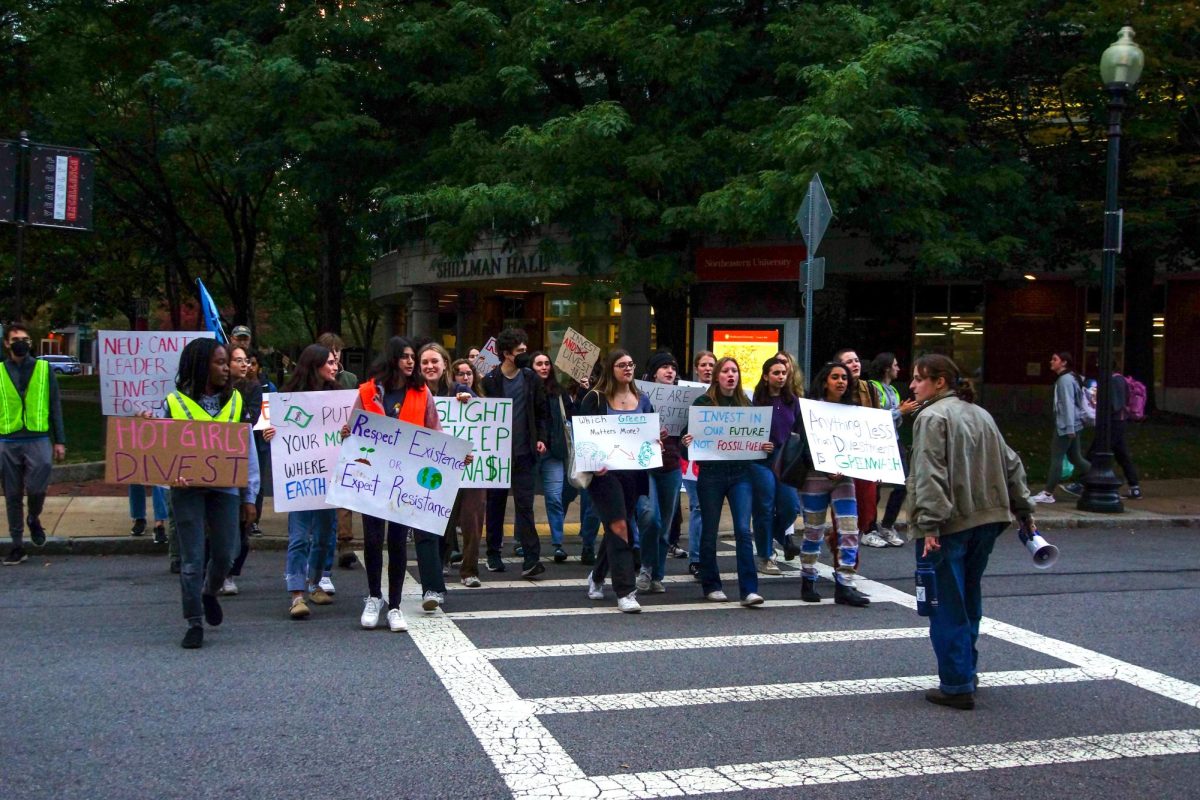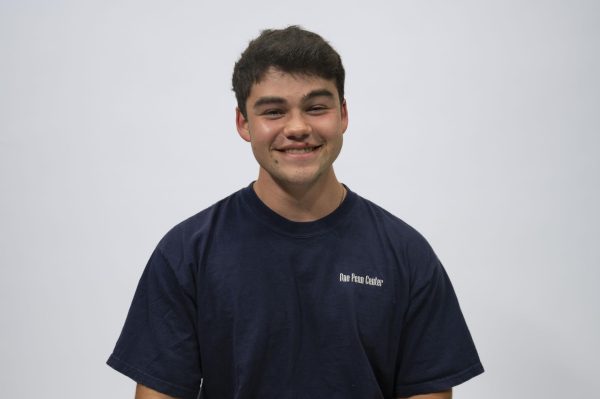Jonathan Bacdayan’s climate anxiety was so acute when he arrived on campus freshman year that he attended a Sunrise Northeastern meeting before he even walked into a class.
From then on, he strove to translate his anxiety into action, including helping to lead Divest Northeastern, a group that advocates for the school to divest its endowment from fossil fuel companies, among other things.
Despite years of work, the recently-graduated environmental studies major is still fed up with what he sees as a lack of commitment to sustainable investment from Northeastern. But that doesn’t mean he’s going to stop trying.
“I’m a very anxious person normally, but I think that climate anxiety and I have come to an understanding,” said Bacdayan, who graduated in May. “I don’t let it stop me. I’ve channeled that into a mindset of just doing something.”
Next year, Bacdayan plans to pursue a master’s degree in environmental science and policy while working for the Northeastern University Arboretum, where he completed his second co-op. Although Bacdayan is busy working and planning for life after graduation, he desires to continue contributing to Sunrise and Divest Northeastern.
Bacdayan is far from alone in his pursuit of measurable progress when it comes to climate action. He is one of many students across the country who channel their love for nature — and, simultaneously, their anxiety about climate change — into a movement.
“There are a lot of students who are passionate about what they want to make changes,” said Annalisa Onnis-Hayden, vice chair for undergraduate studies of civil and environmental engineering. “They are not afraid to get out of their comfort zone and talk with the people in charge of the changes, so I think that’s creating a community.”
Sanshray Kukutla, a first-year political science major on the pre-law track, started feeling climate anxiety in early high school. Spurred by rising temperatures, pollution in his homeland of India and smoke that billowed from wildfires in Canada during the summer of 2023, he knew something had to be done.
“It’s when you have in your mind like a doomsday approaching and you’re like ‘It’s not fixable at all,’” Kukutla said of his climate anxiety. “That’s something that gets you into activism. What got me into activism was seeing that doing something actively against climate change and floods helps suppress my anxiety.”
Like Bacdayan, Kukutla joined Sunrise when he arrived on campus, but has been active in the national Sunrise Movement since late high school. Since joining the youth-led political action organization, he has arranged protests and helped in “electoral fellowship” by motivating congressional support for climate policy and supporting political campaigns for representatives who support sustainability reforms. Now, Kukutla is focused on a policy solution that involves President Joe Biden.
“The biggest idea being pushed forward right now is the climate emergency campaign,” Kukutla said, who was arrested in February along with 20 others who attempted to enter President Biden’s campaign headquarters and speak with his staff about campaign promises surrounding clean energy and climate change. “So currently, we’re trying to get President Biden to declare a climate emergency and confront the climate crisis with green union jobs that invest in our communities, end the fossil fuel era and pay for climate disasters.”
Kukutla also serves as a liaison for hub coordination and the action lead at Sunrise, planning protests and teach-ins around campus and Boston in coordination with Boston University, Boston College and Simmons University Sunrise chapters. One policy that has been at the forefront of his work with the group is the Green New Deal, a blueprint that many college climate organizations have been pursuing.
“The Green New Deal is a set of policies that would make better transitions for clean energy, transportation and also for affordable housing,” Kukutla said. “Any New Deal for Northeastern to implement, which would change some policies, would make Northeastern a more sustainable campus overall and make it a better healthy living space for everyone.”
Along with advocating for systemic change, climate organizations like Divest Northeastern, Sunrise and Husky Environmental Action Team, or HEAT, are also working on ways to educate students about climate change and get them involved in taking action. Outside of its weekly meetings, HEAT — the largest environmentally-focused group on campus — hosts an energy saving competition between some residence halls every fall called “Do It In The Dark.”
Students are encouraged to participate in an incubator at HEAT, where they can help an initiative or launch their own. One of the most successful projects HEAT worked on was Composting at Northeastern, or CANU, which advocated for composting bins in several dorms on campus and plans to expand bin access for all students year round. Another one of the group’s initiatives is SustaiNUbility, which is working to replace one of the current NUpath requirements with a sustainability focused one and ended up passing the Student Government Association referendum this past spring semester. Generation Conscious, or GENCO, is centered around distributing dissolvable laundry detergent sheets campus to those in need. The minority-owned business started an incubator with HEAT to provide laundry detergent sheet refill stations inside residence halls and plans to launch on campus by 2025.
Alegra Germain, who graduated in May as an environmental and sustainability sciences major, has been working as media co-lead for Sunrise for three semesters. In coordination with Kukutla and the action team, she promoted Sunrise’s campaigns by designing graphics, flyers and social media posts.
“It’s been really cool helping me frame the way that I view Northeastern, view Boston in a different context and [what] our place is in the greater community,” said Germain, who has been involved in Sunrise for four and a half semesters.
Germain always planned to study the environment or wildlife in college. However, her first co-op with the Northeastern Arboretum ignited a new curiosity. In between planting and accessioning new plants, planning events for students on campus and working with the Mission Hill Neighborhood Housing Services, she became enthralled by urban nature’s impact on nature connectedness and ecologically conscious consumer behavior.
“The co-op also changed the way that I view nature,” said Germain, who turned her curiosity into research and has been working at Northeastern’s environmental psychology lab since last summer and plans to continue through graduation this summer. “I think for a while I didn’t really include humans [as a contributing part of nature]. I kind of thought of humans as only destructive forms, but having all this background in urban nature now, has really helped to reframe my understanding of nature and my appreciation for it in urban areas.”
Climate activists and changemakers at Northeastern are not alone in their passion for climate study, activism and solution building. They join hands with a community of climate activists around the world. Since they are starting at a younger age, they are of benefit to the movement, research shows.
“Youth participation helps to build broad and inclusive movements, laying the groundwork for success and for inclusive democratic reforms during political transitions,” said social scientist Matthew D. Cebul in his analysis “Youth Activism: Balancing Risk and Reward.”
Cebul, a research officer for the United States Institution of Peace’s program on nonviolent action, said that young activists are especially creative in their ability to congregate groups of differing cultural or ideological divides under one roof. Through their tactic of connectivity through digital platforms combined with less resistance to breaking societal norms compared to older peers, they cultivate the creative fuel that drives interest in their reforms.
Lilly Smith, a third-year environmental engineering major, found a way to contribute to the cause through solution-based research through her co-op at Sublime Systems, a company working to decarbonize the cement industry.
“Climate change is happening, and a lot of times we’re hearing that new things are happening but we’re really not close to fixing it… In a lot of environmental science or environmental engineering coursework, I felt like we were learning different things were going wrong with the environment and other ways that we couldn’t fix it,” she said.
Instead of sitting with fear or anxiety about climate change, Smith shared her desire to find real solutions and inspire others to do the same. Outside of co-op, she contributes her free time to reNU, a new Northeastern club, teaching college students about the technical development of renewable energy. In addition, she is helping the club design a windmill that it plans to enter into the Department of Energy Collegiate Wind Competition this summer.
Smith credited Northeastern with enabling her pursuit of climate problem solving and passion for environmental engineering. She believes her experiences at school and in the field will give her “a leg up in the real world.”
“I was able to get a taste of the whole energy industry in the last co-op, and this co-op, I’m able to get hands-on experience,” said Smith, who has already started to think about her career path. “I’m really able to tell what I like and what I don’t like, and I have these experiences coming out of college.”











